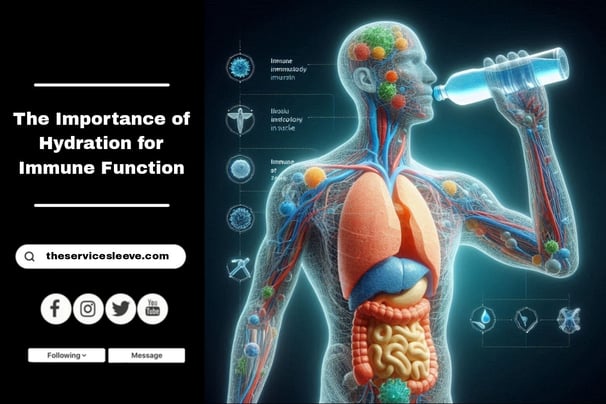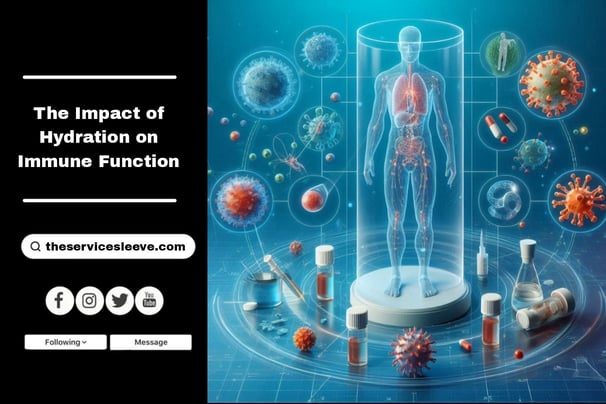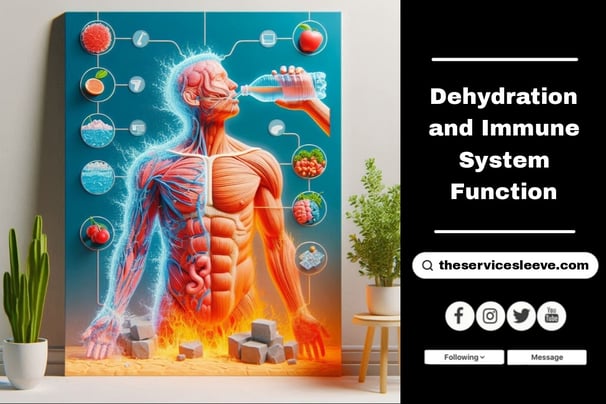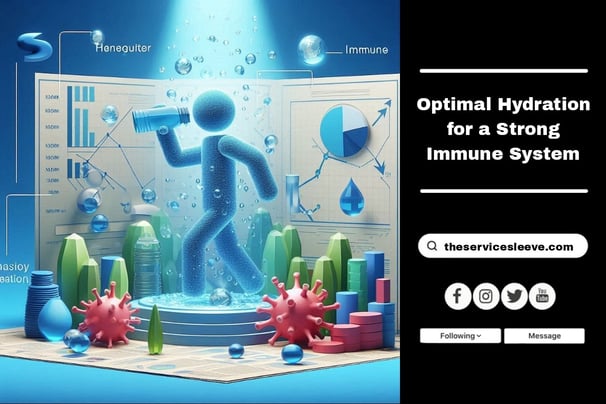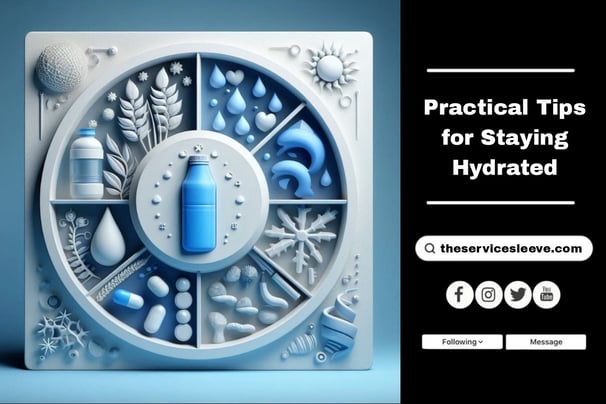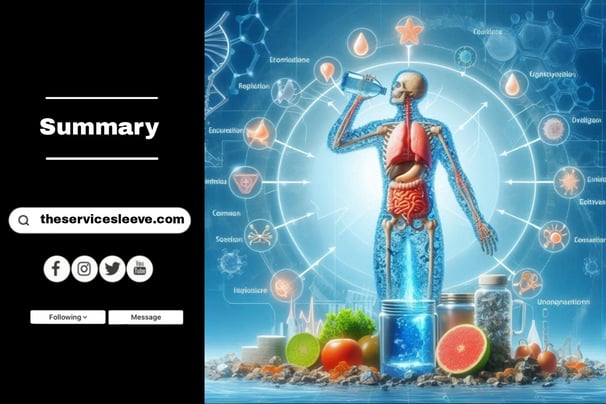Hydration and Immune Function
Discover the vital link between hydration and immune function, and learn practical tips to stay hydrated and support your immune health for better protection.
HYDRATION
Introduction: The Importance of Hydration for Immune Function
A healthy immune system is essential for maintaining good health and protecting the body from infections and illnesses. Every day, our immune system works silently to protect us from harmful pathogens, and giving it the right support is essential. Maintaining adequate hydration is one of the best strategies to strengthen your immune system. Hydration and immune function are closely connected, yet many people overlook the role that water plays in keeping our immune system strong.
Water not only aids in nutrient transport and waste removal, but it also ensures that the body's defense mechanisms function optimally. Your immune system can be weakened if you do not drink enough water, making it more difficult for your body to fight infections. The relationship between hydration and immune function will be discussed in this article, along with the importance of maintaining adequate hydration for a robust immune system.
Understanding the link between hydration and immune function will help you maintain a healthier lifestyle. The benefits of staying hydrated extend beyond simply quenching thirst, whether through drinking more water or maintaining consistent hydration habits. They have a direct impact on how well your immune system protects you.
The Impact of Hydration on Immune Function
Hydration may not be the first thing that springs to mind when considering immune system support. However, the connection between hydration and immune function is undeniable. Water is essential for a variety of bodily functions, including the immune system.
Water as a Nutrient Transporter:
Hydration is critical for ensuring that the nutrients your immune system requires are efficiently delivered throughout the body. Water acts as a carrier for oxygen and essential vitamins and minerals, transporting them to cells, including immune cells. Maintaining adequate hydration makes it easier for nutrients to be distributed, boosting immunity and giving the body the resources it needs to fend off infections.
Detoxification and Waste Removal:
An often-overlooked benefit of hydration is its role in detoxifying the body. Proper hydration supports the kidneys, which help filter and remove toxins and waste products. When you are well-hydrated, your body is more efficient at eliminating these harmful substances, which can otherwise burden the immune system. This cleansing process is crucial in keeping the immune system focused on fighting real threats rather than managing toxin overload. In this way, hydration and immune function work hand-in-hand to maintain a clean internal environment.
Maintaining Mucous Membranes:
The mucous membranes in the respiratory and digestive tracts are the body's first line of defense against pathogens. Maintaining proper hydration keeps these membranes hydrated and functioning, forming a barrier that can hold onto and keep viruses and bacteria out of the body. These membranes may dry out if you're dehydrated, which would make it simpler for infections to get past your defenses. Therefore, maintaining hydration is a key factor in preserving immune function and preventing infections.
Supporting the Lymphatic System:
Water is essential for the lymphatic system, which is involved in the movement of immune cells and the elimination of waste. The majority of the fluid that circulates throughout the body is made up of water. White blood cells must be transported by this fluid to the parts of the body that need them the most in order to combat infections. Insufficient hydration can cause lymph fluid to move more slowly, which could lower the effectiveness of the immune response. Once more, the connection between immune function and hydration is evident: your immune system can function more efficiently and quickly when you are properly hydrated.
Dehydration and Immune System Function
A healthy immune system is supported by adequate hydration, but dehydration can have the opposite effect, impairing your body's defenses. The relationship between hydration and immune function is particularly evident when the body lacks sufficient water. Many vital immune functions can be compromised by dehydration, making you more susceptible to disease and infection.
Impaired Immune Response:
When the body is dehydrated, the immune system struggles to perform its normal functions. Water is needed to transport immune cells throughout the body, and without adequate hydration, this process becomes slower and less efficient. As a result, immune cells may take longer to respond to invading pathogens, delaying your body's ability to fight off infections. In this way, dehydration directly undermines immune function, making it harder for the body to defend itself against illness.
Increased Risk of Illness:
Chronic dehydration puts stress on the entire body, and the immune system is no exception. According to studies, people who don't drink enough water are more prone to common illnesses like the flu and colds. This is because dehydration impairs the function of mucous membranes and the lymphatic system, both of which are essential for defending the body against dangerous bacteria and viruses. The relationship between hydration and immune function is clear — when hydration levels drop, so does the body’s ability to fight off infections.
Long-term Consequences:
Dehydration can have long-term effects in addition to short-term effects on the immune system. Chronic dehydration can eventually cause inflammation and other disorders that weaken the immune system even more. Additionally, oxidative stress, which weakens cells, including immune cells, and increases susceptibility to disease, is more likely to occur in a dehydrated body. Long-term immune health requires preserving the equilibrium between immune function and hydration.
Optimal Hydration for a Strong Immune System
Maintaining a strong immune system requires consistent attention to hydration. Maintaining optimal immune function can be greatly impacted by knowing how much water your body requires and how to spot the symptoms of dehydration. There is no doubt that immune function and hydration are related; your body's defenses are strengthened when it is properly hydrated. Let's examine how to maximize hydration to strengthen the immune system.
How Much Water Should You Drink?
How much water you should drink daily is one of the most frequently asked questions regarding hydration and immune function? While the typical recommendation is around eight 8-ounce glasses per day, individual needs vary based on factors such as age, physical activity, climate, and overall health. Drinking water regularly throughout the day is a basic rule of thumb; however, you should modify your consumption if you are exercising, in hot conditions, or feeling ill. Staying aware of your body’s signals, such as thirst and urine color, can also help ensure you're drinking enough to support both hydration and immune function.
Signs of Dehydration:
Maintaining hydration and immune function requires being aware of the early warning signs of dehydration. Dark urine, weariness, dizziness, and dry mouth are typical signs of dehydration. Ignoring these symptoms can weaken the immune system and increase the body's susceptibility to infection. Early treatment of dehydration helps your immune system stay hydrated so it can work at its best and keep you healthy.
Electrolyte Balance:
Drinking water isn't the only way to stay properly hydrated. It also involves keeping the proper electrolyte balance. Electrolytes—like sodium, potassium, and magnesium—are essential for immune system support and hydration regulation. Even if you're drinking water, dehydration may result from sweating more electrolytes during times of high activity, illness, or hot weather. To maintain this balance, consider incorporating electrolyte-rich drinks or foods into your diet to ensure that your hydration efforts support optimal immune function.
Practical Tips for Staying Hydrated
Maintaining optimal health and bolstering the immune system requires regular hydration. Even though it may seem easy, many people find it difficult to stay hydrated throughout the day. You can make sure that you have good hydration habits by implementing a few doable tactics, which will eventually improve your immune system and general well-being. Let's look at some practical strategies for maintaining proper hydration and balancing immunological response with hydration.
Create a Hydration Schedule:
Creating a routine is one of the easiest ways to maintain proper hydration and immune function. Start your day with a glass of water, and set reminders on your phone to drink water at regular intervals throughout the day. You can also pair drinking water with daily activities, such as after meals or during work breaks, to build the habit effortlessly. Having a structured routine ensures that you consistently stay hydrated, which in turn supports optimal immune health.
Make Use of a Reusable Water Bottle:
Maintaining your hydration goals can be made simpler by carrying a reusable water bottle. Choose a container that suits your lifestyle, whether it’s for the office, gym, or outdoor activities. Consider using water container sleeves to help keep your water at a consistent temperature and to make it easier to transport, which will further increase the advantages. Your devotion to maintaining proper hydration and bolstering your immune system can be significantly improved by this easy-to-use tool.
Include Hydrating Foods:
Staying hydrated doesn't just mean drinking water. Many fruits and vegetables have high water content and can help supplement your daily water intake. Foods like cucumbers, watermelon, strawberries, and oranges are great choices for boosting hydration and immune function. You stay hydrated and gain from the extra nutrients that support a stronger immune system when you include these foods in your meals.
Drink More during Physical Activity and Hot Weather:
During exercise or exposure to hot weather, the body loses more water through sweat, making it crucial to increase your fluid intake during these times. Drink water before, during, and after physical activity to maintain hydration and immune function, and replace lost fluids on particularly hot or humid days. Even in more taxing situations, this will help you maintain proper hydration and immune system function.
Flavor Your Water:
If you find it difficult to drink plain water, try adding natural flavors to make it more enjoyable. You can make your water more refreshing by adding a few slices of lemon, lime, or cucumber, which will motivate you to drink more throughout the day. Staying hydrated is made more pleasurable by flavored water, which also makes it easier to sustain the link between immune function and hydration.
In conclusion, there is a critical link between hydration and immune function!
The relationship between hydration and immune function is essential to preserving good health, as we have discussed throughout this article. Maintaining protective mucous membranes, eliminating toxins, and delivering nutrients and oxygen to immune cells are just a few of the immune functions that are supported by adequate hydration. Conversely, dehydration can weaken your immune system and make you more susceptible to disease by compromising your body's defenses.
Understanding the connection between hydration and immune function allows you to take simple but effective steps to improve your immune health. Maintaining optimal hydration ensures that your immune system remains strong, whether you do this by creating a daily hydration routine, increasing your water intake during exercise or hot weather, or including hydrating foods in your diet.
Recall that maintaining your body's equilibrium to promote long-term health involves more than just drinking water. Utilize resources like reusable water bottles and protective sleeves to make staying hydrated simple and convenient as you place a higher priority on immune system performance and hydration. You can strengthen your immune system and protect your health for years to come by adopting the proper hydration practices.
……………………………………….end of the article……………………………………
